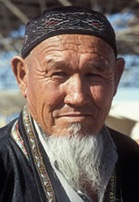 |
The history of the Karakalpak of Uzbekistan includes both times of independence and times of subjection. Although they emerged as a confederation of tribes in the fifteenth and sixteenth centuries, the Karakalpak soon fell under the domination of groups such as the Kazaks and the Dzungarians, who forced them to flee in two directions—one to the Ferghana Basis and the other toward the Aral Sea. Although they were a loose alliance of semi-nomadic tribes before the Russian Revolution in 1917, the Karakalpak formed the Karakalpak republic in Uzbekistan in the 1920s.
The Karakalpak tribes are divided into clans called uru, which are further sub-divided into family groups called koshes. The members of a koshe are the descendants of a common male ancestor and it is not unusual to find as many as four generations of one family in the same household. Large families are considered the ideal and members of the koshe are very loyal to each other.
Agriculture dominates the Karakalpak economy. Cotton accounts for at least sixty-five percent of the farmland and up to ninety percent of Uzbekistan’s income. Many Karakalpak also have feed crops and raise livestock for meat. Most Karakalpak live along the major rivers and irrigation channels in the country; others live along the main railroad line or along the old shoreline of the Aral Sea.
The Karakalpak are generally poor and unemployment is high; however, many make a living working in vegetable plots or gardens, fishing, selling at markets or taking seasonal jobs. The Karakalpak have many health issues brought on by poverty and poor diet, the collapse of the former Soviet health system and the pollution of water supplies by herbicides and defoliants. The incidence of diseases such as tuberculosis, anemia and cancer is high but is slowing decreasing due to some healthcare improvements.
The Karakalpak are Sunni Muslims of the Hanafite branch. The Karakalpak republic is also one of the major centers for the Sufi sect of Islam. Few Karakalpak have ever heard the gospel. Pray God’s light will shine brightly among the Karakalpak and that many will take up the challenge of reaching this people group with the love of Christ.
For more information on the Karakalpak of Uzbekistan, visit:
http://en.wikipedia.org/wiki/Karakalpaks
http://archives.tconline.org/news/lastfrontier/archive/Kara.html
http://www.karakalpak.com/index.html
http://www.global12project.com/2004/profiles/p_code/942.html
http://www.global12project.com/2004/profiles/clusters/8038.html
(Information compiled from www.joshuaproject.net)
(Note: The website links above are intended to provide you with more information about this people group. Some of the links are to groups that are not religious in nature but who provide information and background that may be helpful in researching this people group. The content of each of the websites linked to is the sole responsibility of the linked-to organization. Views expressed on these websites do not necessarily reflect the opinions and beliefs of the staff or writers of Lausanne World Pulse or those of the Lausanne Committee for World Evangelization, Institute of Strategic Evangelism, Evangelism and Missions Information Service or Intercultural Studies Department.)

